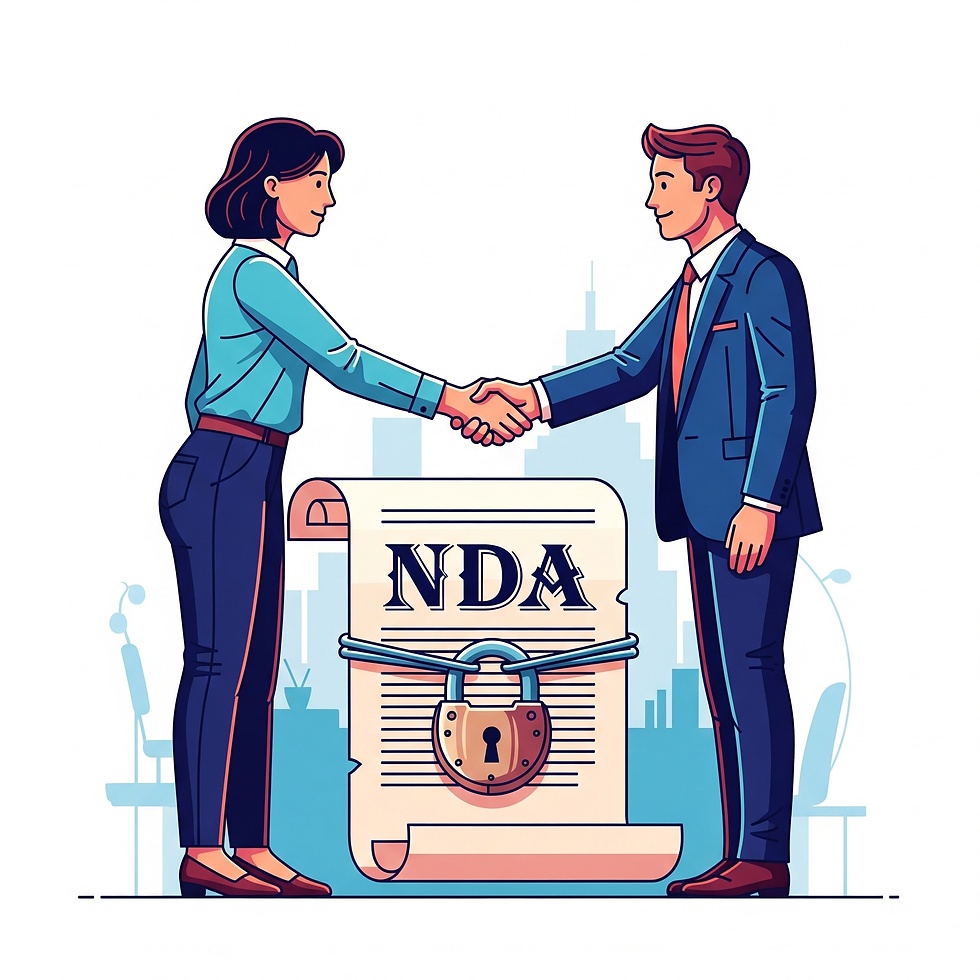Non-Disclosure Agreements (NDAs): Protecting Business Secrets
- Legal Amenity

- Aug 8, 2025
- 4 min read
Introduction
In today's knowledge-driven economy, information is power—and protecting sensitive business data is more crucial than ever. Whether you're discussing a startup idea with a potential investor, outsourcing a project, or hiring an employee, there's always the risk of confidential information falling into the wrong hands.
This is where a Non-Disclosure Agreement (NDA) becomes essential.
An NDA is a legal contract that ensures confidential information shared between parties remains protected. In India, NDAs are commonly used in employment agreements, commercial contracts, joint ventures, and intellectual property arrangements. This blog will help you understand the significance, structure, and enforceability of NDAs under Indian law.

What is a Non-Disclosure Agreement (NDA)?
A Non-Disclosure Agreement is a legal contract between two or more parties, where one or all parties agree not to disclose or share certain information with unauthorized third parties.
NDAs are vital in:
Preventing theft of business ideas
Securing sensitive customer data
Protecting product or software designs
Guarding trade secrets or proprietary information
Under the Indian Contract Act, 1872, an NDA is considered a valid contract if it fulfills the essentials of a contract—free consent, lawful object, lawful consideration, and competency to contract.
Types of NDAs
1. Unilateral NDA
In this type, only one party discloses confidential information, and the other agrees not to disclose it. Common in employer-employee or client-contractor relationships.
2. Mutual NDA
Both parties share confidential information and agree to protect each other’s data. Suitable for joint ventures, partnerships, or collaborations.
3. Multilateral NDA
Involves three or more parties, where at least one party discloses information and all agree to maintain confidentiality.
Key Elements of a Strong NDA
A well-drafted NDA should include:
1. Definition of Confidential Information
Clearly outline what qualifies as confidential—documents, emails, customer lists, financials, software codes, etc. This prevents ambiguity during enforcement.
2. Obligations of the Receiving Party
Specify what the receiving party can and cannot do with the confidential data. Include:
No unauthorized disclosure
No reproduction or copying
Secure handling of information
3. Term and Duration
Mention how long the agreement is valid and for how long confidentiality must be maintained—even after termination.
4. Permitted Disclosures
Identify exceptions such as:
Information already in the public domain
Disclosure required by law or government agencies
Data already known to the receiving party prior to NDA
5. Consequences of Breach
Outline legal remedies, including:
Injunctions (court orders to stop disclosure)
Monetary damages
Legal costs and penalties
6. Governing Law and Jurisdiction
Specify that the agreement is governed under Indian laws and the courts having jurisdiction (e.g., Delhi, Mumbai).
When Should You Use an NDA?
During hiring of employees with access to sensitive data
When outsourcing tasks to freelancers or third-party vendors
While pitching a business plan to investors
During mergers, acquisitions, or due diligence
When collaborating with another company or brand
Common Mistakes in NDA Drafting
1. Vague Definition of Confidential Information
Avoid general terms like “any and all information.” Be specific to ensure enforceability.
2. No Specific Timeframe
Not stating how long the NDA is effective can lead to legal loopholes.
3. Lack of Remedies Clause
Without this, you may have to prove extensive damages in court to get compensation.
4. Not Customizing Templates
Using online templates without customizing to Indian legal standards or your specific business needs can render your NDA weak.
Are NDAs Enforceable in India?
Yes, NDAs are enforceable under the Indian Contract Act, 1872. However, Section 27 of the Act prohibits agreements in restraint of trade. Courts in India have consistently upheld NDAs that:
Protect genuine trade secrets
Are reasonable in scope and duration
Do not unfairly restrict an individual’s right to livelihood
Enforcement is usually done through:
Injunctions (to prevent further disclosure)
Damages for loss of business or goodwill
Courts often favor injunctions over monetary compensation in such cases.
Best Practices for NDAs
Always define the purpose for which the information is being shared
Ensure digital signing or notarization where necessary
Restrict access only to necessary personnel
Implement internal confidentiality policies alongside legal agreements
Periodically review and update your NDAs with evolving business needs
Sample NDA Use Case
Scenario: A startup shares its product pitch and codebase with a potential investor. Solution: Use a mutual NDA to ensure the investor cannot disclose or use the information independently or with competitors.
Result: Legally backed confidentiality and protection of intellectual assets.
Conclusion
In an era where data breaches and corporate leaks can cause irreparable damage, NDAs offer an affordable yet powerful solution to protect your business interests. Whether you're an entrepreneur, employer, service provider, or collaborator—having a tailored NDA in place is not optional; it’s essential.
___________________________________________________________________________________
FAQs
Q1: Can an NDA be enforced if it is not notarized?
Yes, an NDA is enforceable as long as it is duly signed by both parties, even if not notarized.
Q2: What is the typical duration of an NDA in India?
Typically 2–5 years or as agreed upon. Some clauses may extend beyond termination for long-term confidentiality.
Q3: Can an employee refuse to sign an NDA?
Yes, but the employer can make signing it a condition of employment or business engagement.



Comments